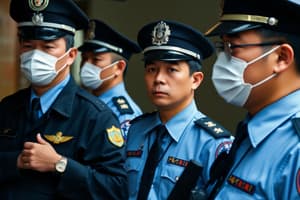Podcast
Questions and Answers
What system was organized for the security of the country during the reign of Alfred the Great?
What system was organized for the security of the country during the reign of Alfred the Great?
- Tithing system (correct)
- Marine Police Force
- Vigiles of Rome
- Praefectan Urbi
Which individual is known as the father of modern policing?
Which individual is known as the father of modern policing?
- Henry Fielding
- Sir Robert Peel (correct)
- Eugene Francoisé Vidocq
- Patrick Colquhoun
What was the primary role of the Praetorian Guard in ancient Rome?
What was the primary role of the Praetorian Guard in ancient Rome?
- Civil defense force
- Firefighters
- Judicial officers
- Police officers protecting the emperor (correct)
What significant contribution did Edmond Locard make to criminal investigation?
What significant contribution did Edmond Locard make to criminal investigation?
Which group, founded by Henry Fielding, is recognized as the first professional police force?
Which group, founded by Henry Fielding, is recognized as the first professional police force?
Flashcards are hidden until you start studying
Study Notes
Early Policing in Ancient Times
- 6th Century BC (Athens): Magistrates acted as judges, providing judicial decisions; the first organized form of social control emerged during the reign of Alfred the Great.
- Ten Tithing: A system comprising 100 groups responsible for maintaining order and handling serious criminal matters.
- Tithing: Groups of ten were formed to protect each other and hold members accountable, led by a "chief."
Policing in Ancient Rome
- Praetorian Guard: The first police unit in Rome, tasked with protecting the emperor and the palace.
- Praefectan Urbi: An official with both executive and judicial powers responsible for city safety.
- Vigiles of Rome: Created as a civil police force, they served as firefighters and protectors of citizens.
Development of Policing
- 1285 AD: Introduction of the Statute of Winchester, a significant legal framework for policing in England.
- 1720s: Jonathan Wild recognized as London's notable thief catcher and effective criminal investigator.
The Rise of Organized Police
- Henry Fielding (1449): Established the Bow Street Runners, regarded as the first professional police force in London.
- John Fielding: Henry's blind half-brother, known for memorizing the voices of 3,000 criminals, aiding in police efforts.
- Eugene François Vidocq: Led a squad of ex-convicts to assist the Paris police, employing unconventional tactics such as setting a thief to catch another.
Contributions to Criminal Investigation
- Dr. Edmond Locard: Advocated for the use of scientific methods in criminal investigation, introducing the principle that "every contact leaves a trace."
- Sir Robert Peel: Founded the London Metropolitan Police Force in 1829, considered the world's first modern organized police force; police were nicknamed "bobbies" or "peelers."
- Patrick Colquhoun (1800): Established the Marine Police Force, further advancing the organization of policing in urban areas.
Studying That Suits You
Use AI to generate personalized quizzes and flashcards to suit your learning preferences.




